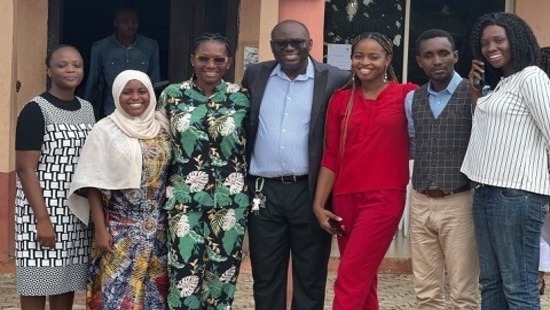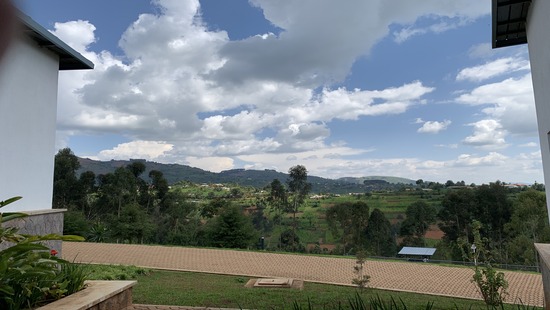Lumati Leads Research on the Impact of Financial Catastrophe and Cancer Care

Poverty and limited access to education and good healthcare lead to long-term health and wellbeing issues that repeat across generations in a vicious cycle, and addressing these challenges is an important global initiative. Working toward that initiative is the Ryan Family Center for Global Primary Care, a part of the Robert J. Havey, MD Institute for Global Health, who created the SHELTER Tea Champions program to improve health and education for children, with the ultimate goal of fostering empowerment.

The SHELTER Tea Champions program addresses issues with a goal to improve health and education for children in Assam, India.
India is the second largest producer of tea globally, with Assam, a state in northeastern India, generating half of their total tea production. While the state churns out the world’s most popular teas, tea plantation workers in Assam are faced with extremely poor health, precarious living and working conditions, and a lack of educational opportunities. For instance, among the Assam garden tea community, math, reading, critical thinking and health literacy skills are fall below the average standards, with literacy rates at 46 percent, which is one of the lowest in the state when compared with Assam's overall literacy rate of 72 percent. In addition, tea garden families see elevated school dropout rates, particularly among girls. Together, this perpetuates the cycle of poverty and increases the risk of child labor and human trafficking.
Supporting Health, Education & Lifelong Healthy Habits: Towards Empowerment and Resilience (SHELTER): Tea Champions directly addresses these issues. The Centre for Development Initiatives (CDI) of the Missionary Sisters of Mary Help of Christians in Guwahati, Assam reached out to Jyothy Puthumana, MD, professor of Medicine in the Division of Cardiology, to address this gap in education and health literacy for children on the Assam tea plantations. With a shared goal to improve educational opportunities and overall health, and support from the Havey Institute for Global Health, the collaboration launched the SHELTER Tea Champions program in May 2024.
The project, which is also supported by the School of Education and Social Policy at Northwestern University and the Maternal and Child Health India program of the Johns Hopkins Bloomberg School of Public Health, was designed to offer children educational opportunities in math, reading and health.

The program supports student leadership skills through health literacy learning and activities.
The CDI of the Missionary Sisters of Mary Help of Christians have been working in this community and tea garden for the last two to three decades – mostly targeting the vulnerable girl child – to identify skills and training with the goal to decrease risk for human trafficking, according to Puthumana.
“Based on their work, lack of ability to advance to high school and opportunities outside of the tea garden seemed to be responsible for intergenerational poverty, increasing the risk for being trafficked and decreasing the life span among these workers,” Puthumana said.
Puthumana is lead investigator on the project, working in collaboration with Lisa Hirschhorn, MD, MPH, director of the Ryan Family Center for Global Primary Care.
Based on results from an initial survey, Puthumana, Hirschhorn and Gautam Bisht (School of Education and Social Policy ‘25), identified baseline levels of reading, math and health literacy and have been training tutors both in person and remotely to help engage students.
“Prior CDI projects had identified that engaging these children in programs, including after-school tutoring, enabled them to stay in school, potentially progress to high school, and maybe disrupt this cycle of continued generational manual labor,” Puthumana said.
Through the SHELTER Tea Champions program, ten tutors were initially hired to deliver after-school academic tutoring and other extracurricular activities, such as physical activities and health education, or approximately 500 children in groups of 25 twice a week. Tutors were trained on pedagogical tools and approaches to help the students during the after-school sessions.
“We equip these mentors through ongoing training that helps them grow both as educators and as individuals, enabling them to design learning activities and track progress,” Bisht said. “Many of these mentors are pursuing college degrees and aspire to become government school teachers, open private educational centers, or launch community-based enterprises. Their leadership within the villages not only supports children’s learning today but also offers inspiring examples of what’s possible for the next generation.”
The SHELTER Tea Champions project identified baseline levels of reading, math and health literacy to engage students and improve their experiences inside and outside of the classroom.
Since its launch, the SHELTER Tea Champions program has seen significant advancements for students, including more than 90 percent school attendance for both boys and girls; improvement in student skills and performance, as well as noted parent satisfaction and enthusiasm for the project. To continue these efforts, in June 2025, Northwestern University Feinberg School of Medicine and the School of Education and Social Policy held workshops to further train tutors in addressing gaps in health literacy identified by the initial survey. In the 20 villages where the program is implemented, additional expansions include tutor training, assessments and mentorship. The project has also recently received additional funding from the Sherman Fairchild Foundation.

Tutor training workshops, available both virtually and in person, address gaps in health literacy.
The program continues to expand through tutor training, both virtually and in person, with the goal of improving knowledge gaps in math and reading, as well as health literacy topics such as hygiene, nutrition, preventive care, exercise, and mental health. Tutor instruction includes pedagogy training based on the Teaching at the Right Level (TaRL) approach which is a globally recognized and evidence-backed methodology that helps children acquire foundational skills by grouping them according to learning level rather than age and using level-appropriate strategies to accelerate progress. The tutors will also be supported to co-create new learning materials that are culturally and linguistically rooted in the everyday lives of the children. This ensures that teaching not only builds academic skills but also strengthens connections to local knowledge, identity and language. To monitor differences as the children age, the program tracks changes in math, literacy and health knowledge.
As the program grows, the team looks to deepen the it by developing peer mentors and role models from within the current cohorts, and by identifying and supporting student leadership skills, the team can help to empower them. The goal is for these students to become agents of change within and beyond the cohort and contribute to sustainable development in the community.
The project is funded through August 2026.
Lisa Hirschhorn, MD, MPH, is director of the Ryan Family Center for Global Primary Care at the Robert J. Havey, MD Institute for Global Health and a member of the Northwestern University Clinical and Translational Sciences Institute (NUCATS) and Center for Dissemination and Implementation Sciences in the Institute for Public Health and Medicine (IPHAM). Jyothy Puthumana, MD, is a member of the Havey Institute for Global Health.
Learn more about the Ryan Family Center for Global Primary Care by visiting their website.
For details on events, news and funding opportunities, sign up for the Havey Institute for Global Health newsletter.

